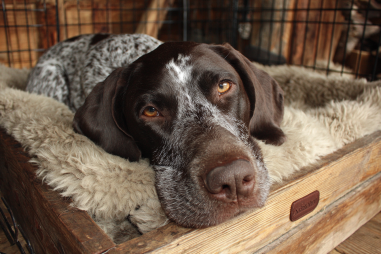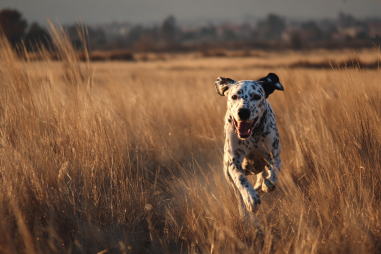Proper nutrition plays a crucial role in ensuring your Pointer dog stays healthy, energetic, and happy throughout their life. As an active and athletic breed, Pointers have specific dietary requirements that must be met to support their energy levels, muscle development, and overall well-being. Whether you’re a new Pointer owner or have been caring for this breed for years, understanding how to feed your dog a balanced and nutritious diet is essential. This guide breaks down everything you need to know about feeding your Pointer, from selecting the best food to managing portion sizes, supplements, and monitoring their weight.
Nutritional Needs of Pointer Dogs
Pointers are medium to large-sized dogs known for their high energy and stamina. Because of their active lifestyle — whether participating in outdoor activities or simply playing at home — they require a diet rich in high-quality proteins, fats, and essential nutrients to maintain muscle mass, support joint health, and fuel their endurance.
Protein is especially important as it provides the amino acids necessary for muscle repair and growth. Look for dog foods where a high-quality animal protein, such as chicken, beef, or fish, appears as the first ingredient. Healthy fats, including omega-3 and omega-6 fatty acids, help maintain a shiny coat, healthy skin, and support brain function.
Carbohydrates provide the energy needed for their active lifestyle, but these should come from digestible and wholesome sources like sweet potatoes, brown rice, or barley to avoid unnecessary weight gain. Additionally, vitamins and minerals, including calcium and phosphorus, are essential for bone strength and overall vitality.
Choosing the Right Dog Food
With many dog food options available, selecting the best one for your Pointer can feel overwhelming. It’s important to choose foods formulated to meet the nutritional guidelines established by organizations such as the Association of American Feed Control Officials (AAFCO). These guidelines ensure that the food contains all essential nutrients your dog needs for maintenance or growth.
When choosing a commercial dog food, consider whether your Pointer has any special dietary requirements, like allergies or sensitivities, as some formulas cater specifically to these needs. High-quality dry kibble (dry dog food) and canned (wet) options are both viable, and mixing them can provide variety and moisture. You should also pay attention to the ingredient list and avoid foods with excessive fillers like corn, wheat, and soy, which offer limited nutritional value and may contribute to digestive issues in some dogs.
Consultation with your veterinarian can help identify the most appropriate diet based on your Pointer’s age, activity level, and health status.
Homemade vs Commercial Diets
Some owners prefer to prepare homemade meals for their Pointers to have complete control over ingredients and avoid additives often found in commercial foods. Homemade diets can be nutritious and well-balanced if carefully planned but require substantial knowledge of canine nutrition to avoid deficiencies or excesses.
If considering a homemade diet, it is important to:
- Include a balance of protein, carbohydrates, healthy fats, vitamins, and minerals.
- Incorporate a variety of food sources like lean meats, vegetables, grains, and supplements where necessary.
- Consult with a veterinary nutritionist to develop a meal plan that meets all nutrient requirements.
- Be consistent and avoid sudden changes that might upset your dog’s digestive system.
Commercial diets, in contrast, are convenient, have consistent nutrient profiles, and are often fortified with essential vitamins and minerals. For many owners, high-quality commercial foods remain the most practical solution, especially when paired with occasional homemade treats or supplements.
Recommended Feeding Schedules and Portion Sizes
Pointers thrive when fed according to a regular schedule, which helps regulate their metabolism and prevent overeating. Puppies typically require more frequent feeding sessions — usually three to four times a day — to support rapid growth and developing energy needs.
Adult Pointers generally do well on two meals per day, spaced about 8-12 hours apart. Some active Pointer owners even split daily rations into three smaller meals to maintain steady energy levels throughout the day.
Portion sizes vary based on your dog’s weight, age, activity level, and the calorie density of the food. As a general guideline:
- Adult Pointers weighing between 45-75 pounds may require approximately 1,200 to 1,800 calories per day.
- Adjust portion sizes downward or upward depending on activity level: more active dogs need more calories, while less active dogs require less.
- Always monitor your Pointer’s body condition by feeling their ribs and observing their waistline, and adjust portions accordingly.
Remember, free feeding (leaving food out all day) is not recommended for this breed as it can lead to overeating and weight gain.
Supplements and Treats
While a balanced diet should provide most of your Pointer’s nutritional needs, supplements can sometimes provide added benefits, particularly for joint health and coat condition. Common supplements for Pointers include:
- Omega-3 Fatty Acids: Found in fish oil, these support healthy skin, coat, and reduce inflammation.
- Glucosamine and Chondroitin: Help maintain healthy joints, especially important for active Pointers prone to joint wear.
- Probiotics: Aid in digestion and promote a healthy gut microbiome.
Before introducing any supplement, it’s best to consult your veterinarian to determine if it’s necessary and safe for your dog.
Treats can be a valuable training tool and a way to bond with your dog but should make up no more than 10% of their daily caloric intake to avoid unnecessary weight gain. Opt for healthy treats like small pieces of lean cooked meat, vegetables, or commercial low-calorie treats specifically formulated for dogs.
Monitoring Weight and Health Through Diet
Maintaining an ideal weight is crucial for your Pointer’s longevity and quality of life. Regularly monitoring your dog’s body condition ensures they stay within a healthy range, preventing issues like obesity or malnutrition.
Some signs your Pointer may be overweight or underweight include:
- Difficulty feeling ribs or excessive fat covering the ribs (overweight).
- Prominent ribs, spine, or hips, visible muscle loss (underweight).
- Lethargy or lack of enthusiasm for exercise.
- Changes in appetite or digestive issues.
Regular veterinary checkups should include weight assessments and nutritional evaluations. If you notice any sudden weight changes, discuss them with your vet to adjust the diet accordingly or to investigate underlying health problems.
In addition, keeping a feeding diary or tracking your Pointer’s food intake, activity levels, and weight can help identify patterns and provide data to make informed adjustments to their nutrition.
Feeding your Pointer the right nutrition is key to supporting their active lifestyle and overall health. By understanding their nutritional needs, selecting appropriate foods, managing feeding schedules, considering supplements carefully, and monitoring their weight, you’ll be well-equipped to keep your Pointer thriving for years to come. Remember, every dog is unique, so remain attuned to your Pointer’s individual needs and work closely with your veterinarian to tailor their diet accordingly.







